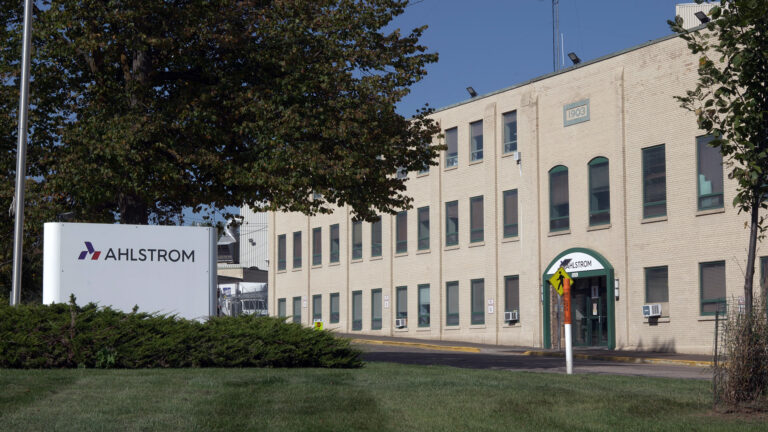How Wisconsin is creating the future of precision medicine
Rapid advances in medical research are transforming how disease is treated at an individual level — the state's federal designation as a biohealth technology hub is generating high hopes for business.
By Steven Potter | Here & Now
July 2, 2024
A couple of years ago, when she was 43, Megan Haensgen had a doctor’s appointment.
“I went in and saw a colorectal surgeon. He sat down, looked me square in the face and said, ‘I’m almost 100% certain you have anal cancer.’ And I argued. I said, ‘No, I’m here for my hemorrhoid.’ He gave me a minute, and then I realized what he was saying. So that was the start of the journey,” Haensgen said.
“They did a biopsy in the office that day,” she continued. “Everything was very quick, rushed. I definitely felt a sense of urgency. I knew I’d been walking around with cancer for several years, so I was really scared.”
Haensgen asked doctors if her cancer treatment could be done close to home in Milwaukee.
“They said, ‘No, we feel strongly that this is where you need to be – at this main campus location – because they have the Radixact machine,'” she shared.
The Radixact radiation therapy machine was designed to deliver cancer-killing beams of energy to a very focused area.
Given the sensitive spot of Haensgen’s cancer — and the proximity to the rest of her digestive system — that’s exactly what she needed.
“As a patient, you want as targeted a therapy as you can get so you don’t damage healthy tissue and so you can spare your quality of life,” she said.
That kind of precision — tailor-made treatment based on the individual patient’s conditions, ailments and body needs — is known as precision or personalized medicine, and researchers say it’s the wave of the medical future.
Every patient is a unique individual. They have their own genetics, their own exposures to the environment that they have been in,” said Dr. Muhammed Murtaza, associate director of the Center for Human Genomics and Precision Medicine at the University of Wisconsin-Madison. “And, so, precision medicine is this approach that could we actually learn more about each individual patient, so that each patient gets the right drug at the right time.
Another major component of precision medicine, he says, is looking at a patient’s DNA.
Doctors like Murtaza work to explore how precision medicine can develop treatments for patients with ailments like asthma, COPD, kidney disease and, of course, cancer.
“How do you tailor, how do you optimize the dose of that therapy based on their genetic makeup? Not just the makeup of their cancer, but actually their genetic makeup that they were born with,” Murtaza explained.
He said we’ve barely scratched the surface of what these new medical advancements can do.
“What I see precision medicine interacting with a lot more is these new advances in data science and artificial intelligence and machine learning, which can help us really make sense of this data and then make better clinical decisions,” he said.
But precision medicine isn’t just research and patient treatment – it’s also big business.
A number of Wisconsin companies are poised to be the lead innovators in this medical revolution.
One of these businesses is a company called Accuray, which moved its headquarters to southern Wisconsin in 2023.
“Accuray has three products,” explained Daniel Biank, a vice-president and spokesperson at Accuray. “The CyberKnife. Radixact, which is also the former TomoTherapy which originated here in Wisconsin. And then the precision planning software. That’s where the doctors pull in MRI and CT images and they literally paint on the image. Where do they want to irradiate? And then the areas that they want to protect from radiation.”
Accuray is one of many other precision and personalized medicine companies operating in Wisconsin.
“We have leaders in genomics, like Exact Sciences for diagnostics, Illumina for DNA sequencing. And then we have this supply chain that’s built around Plexus and Rockwell, where we actually manufacture and make things here,” Biank said. “Then we have the clinical institutions like UW and the Medical College of Wisconsin. So within Wisconsin, we have the whole ecosystem of what we were calling the invent, build and deploy life cycle for personalized medicine.”
Because of this network of companies, the federal government designated Wisconsin as a biohealth technology hub in October 2023.
On July 2, it was announced that Wisconsin will receive almost $50 million from the federal government for biohealth industry companies in the state to grow their capacity. This influx of cash is expected to help companies add some 30,000 jobs in the state over the next five years.
Lisa Johnson is the chief executive officer at BioFoward, the state’s biohealth industry association. She explained the objective behind this designation:
“To fund tech hubs throughout the country in key technology areas where the United States needs to become more competitive,” she said.
The BioForward association also brings together partnerships for data collection and use with the intent to benefit patients. One example is a partnership between the SciNote Electronic Lab Notebook company and the cloud infrastructure provider Ganymede Bio that redefines how data is collected and consumed within laboratories.
“That data collection that really guides our physicians, but also certainly our innovators on where and what kind of drugs should be brought to market,” Johnson said. “We get that data from medical imaging, from our diagnostics to really guide where we should go with our drugs in the future.”
“Personalized medicine is about the right treatment for the right patient at the right time,” Biank said. “The goal is to give them effective care, but also not to give them unnecessary care when they’re going through unnecessary procedures, unnecessary tests, maybe having side effects that they don’t need to face, but to really match them with what’s going to address their disease.”
For patients like Haensgen — who is now cancer free after chemotherapy and laser-focused radiation — precision and personalized medicine made a life-altering difference. She hopes the advancements continue.
“Even since the three years that I’ve been treated, I know that my doctors and my team at my hospital on this machine are doing things a little differently. And that’s just in the last three years,” she said. “So I can only imagine that research and innovation will just improve going forward to make things even better for future cancer patients and future generations.”
 Passport
Passport











Follow Us